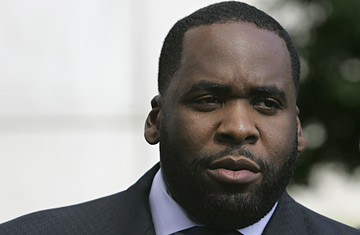
Detroit Mayor Kwame Kilpatrick addresses the media in Detroit, Tuesday, September 11, 2007.
Detroit's Kwame Kilpatrick was named one of America's worst mayors by TIME in 2005. Have his fortunes changed since then? Not if you go by court decisions. Last week, a Michigan jury awarded $6.5 million to two former Detroit police officers who alleged they were retaliated against for investigating possible misconduct by Kilpatrick's bodyguards. The award is the latest blow for Kilpatrick — even as his city makes some gains.
At a time when many of America's few remaining big-city black mayors are young, polished and corporate-minded, Kilpatrick seems to be a bit of a throwback. He became mayor in 2002 at age 31, the youngest mayor in the city's history. Cultural icon Russell Simmons crowned him the nation's first "hip-hop mayor" and Kilpatrick, now 37, did not try to avoid a life of excess. His first inauguration was marked with "club crawls" (he said they were intended to galvanize Detroit's disaffected youth); he wore a diamond-studded earring and flashy suits; his wife got use of a Lincoln Navigator that was leased for $25,000 by the police department. The two Detroit cops then charged Kilpatrick's bodyguards with abusing overtime and failing to report accidents involving city vehicles. Overtime abuse was never proven, and an accident report was found. Nevertheless, the cops claimed they had been retaliated against for looking into the allegations, and that lawsuit would go on for three years. It was interlaced in the public's awareness with newspaper coverage of allegations of the mayor's marital infidelities. Kilpatrick has repeatedly denied the claims. As for last week's defeat in court, Kilpatrick says he will appeal, at any cost. Later this month, a judge will hear a related case involving a third former officer.
All this couldn't come at a worse time. Much of Detroit remains an urban war zone, having seen its population more than halved from a 1950s peak of nearly 2 million. Unemployment stands at roughly 14%. About 47% of the city's residents over age 16 are functionally illiterate. Yet, for much of Kilpatrick's tenure, parts of Detroit have experienced an economic turnaround similar to those that have taken place in Chicago and Washington. Million-dollar lofts are being built along the Detroit River. Homicides are down by 17%, and non-fatal shootings have dropped by 9% in the last year. Kilpatrick sliced the city government's job rolls from about 21,000 to 13,800. He cut property taxes partly to retain what remains of the city's middle class.
In an interview with TIME, Kilpatrick blamed some of his "boneheaded" behavior — particularly during his first term — on his youth, and his initial inexperience managing a major city. His image, especially the earring, alienated many of Detroit's black professionals, notably middle-aged women. "They didn't think I had the life skills, or they thought I wasn't like their sons — engineers or doctors," he says.
The fact is, however, that Kilpatrick grew up in a powerful Michigan political family. His mother, now chairwoman of the Congressional Black Caucus, spent years in Michigan's legislature. His father was a county commissioner. A former college football captain who trained as a lawyer, Kwame Kilpatrick himself was a rising star in Michigan's legislature before being elected mayor. So he was hardly a political neophyte when he displayed behavior many view as unseemly for a sitting mayor of a major American city. For many, Kilpatrick's style and his attempts to cast himself as a racial martyr sent the message that, "This is our city now, and the thug life is OK," says Mildred Gaddis, 53 and one of Detroit's most popular black talk-radio personalities. "This hip-hop thing," she observes, "it turned off a lot of people who initially supported him." Gaddis says she was one of them.
So he stopped wearing the earring. Nevertheless, in 2005 he became the first incumbent Detroit mayor not to win a primary election. (He placed second in the Democratic primary, which allows the top two finishers to contest the general election.) He bounced back after urging voters to focus on his administration's management, rather than his style, pointing to road and sidewalk improvements and new recreation centers. However, a leader's effectiveness is partly tied to perception, and that's potentially risky in a city whose recovery is so fragile. Given his decision to fight the court award, many in Detroit are now asking if he is too big a financial liability. "He's got so much potential, but at the same time he's almost institutionalized arrogance," says Sam Riddle, a Detroit political consultant. The Detroit Free-Press last month reported that only 36% of Detroit residents approve of Kilpatrick's job performance.
Kilpatrick insists he can win reelection in 2009. In the meantime, he must win back the confidence of several key constituencies — starting with older black voters like Charles Paschell, 80. Standing outside one of the few supermarkets on one of the city's main thoroughfares, Woodward Avenue, Paschell said he was initially attracted to the mayor's youthful energy. Now, however, his view has changed. "He's a mayor — he's got no business acting like he's been [doing]," Paschell says. "I'd like to see a young person make us look good."
